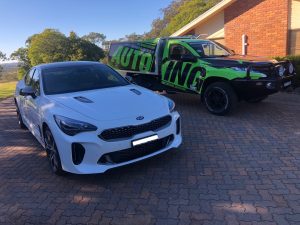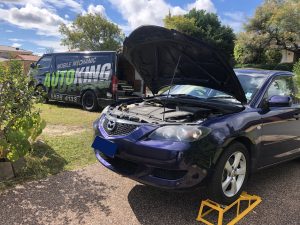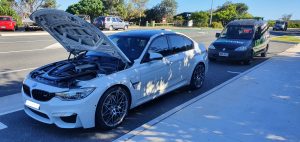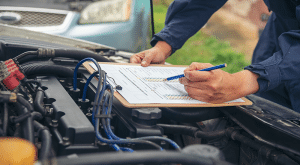Nowadays, a light press on the brake pedal can slow your vehicle to a complete stop, all thanks to the complexities of your braking system. Like other parts of your car that go to work every day, your brakes are prone to wear out over time—especially your brake pads. Brake servicing is one of many routine maintenance chores you simply cannot ignore. Unlike other auto maintenance requirements, a failing brake can genuinely be the difference between life and death.
Fortunately, your car or truck usually gives you some clear signals that your brakes are due. Sometimes they’re harmless noises that don’t require repairs or have simple fixes. Other times not.
Your brakes are one of the most important safety components in your vehicle. So if you notice any of the following common warning signs of brake issues, it’s time to get a professional to check your car, truck, or SUV pronto. You’ll drive safer and head off more expensive damage.
Your Brake Light comes On
This dashboard indicator light could come on for several reasons, none of which you want to ignore. The light could be clueing you into a problem with the brake’s hydraulic system, your brake fluid level could be below, or your parking brake may be engaged. Whatever the reason for the light, your ability to safely come to a stop isn’t worth risking.
Grinding Noise when you apply brakes
One of the most common signs of brake trouble is a grinding or squealing noise that occurs when you hit the brakes. This is most commonly an indication that the brake pads have worn away. The noise you are hearing is metal grinding on metal, a clear sign the brakes need service right away.
Spongy or Soft Brake Pedal
If you notice a difference in the resistance in the brake pedal — it feels “softer,” or sinks all the way to the floor mat when you press on it — it’s a sign you need immediate service. There could be air or moisture in the braking system or a problem with the master cylinder. Generally, in autos with power brakes, the pedal should stop 1 to 1 ½ inches from the floor. If you have manual brakes, the pedal should stop more than 3 inches from the floor.
Your car pulls to one side as you brake
If your car starts to pull to the left or right, it could mean that one of your calipers has gotten stuck within the braking system or that you have a brake fluid leak. We’ll do a comprehensive inspection to diagnose what’s causing the pull … and get you feeling balanced again.
The brake pedal vibrates when pressed
This could indicate that your rotors have thinned or warped due to heat differences caused by wear. If you can feel a vibration in the brake pedal, steering wheel, or throughout the vehicle while slowing your car you should be concerned. The most common cause of this is warped rotors, which are what your car’s brake pads squeeze to create friction to stop the vehicle.
General wisdom says to have your brakes (including your brake pads) inspected every 5 months or 5,000 miles, but your manufacturer guidelines may give you better guidance for your specific vehicle. If you’re hearing grinding, squeaking, or squealing, your steering wheel feels shaky, or your brake warning light is on you can contact, Mr. Mechanic.
We’ll evaluate your front brakes and rear brakes to diagnose where the problem lies before further damage is done. A fix today will save you time and money in the long run!
Auto King Mobile Mechanics can come to you for any vehicle repair, service, and inspection needs. Book or Call for a free quote!





